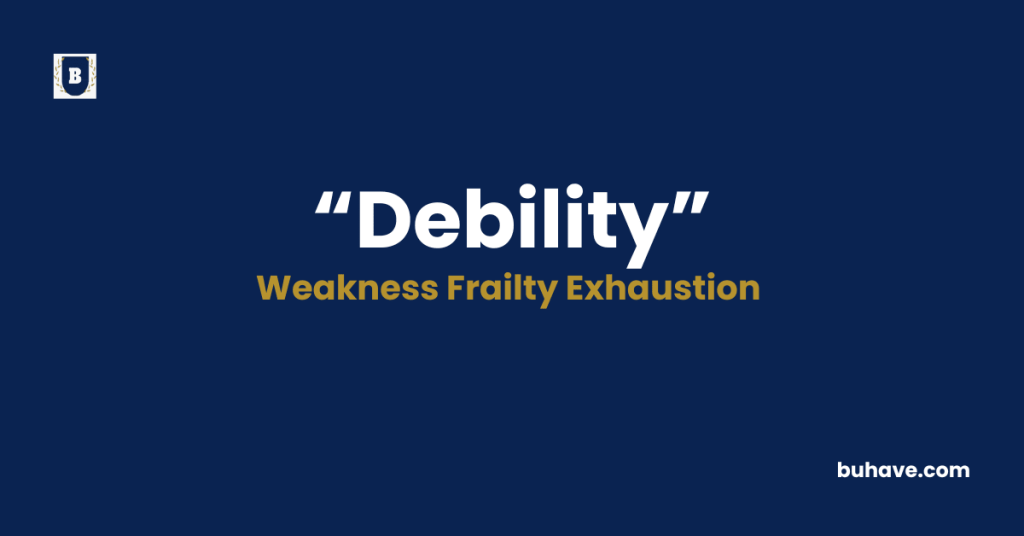The word Debility (Noun) refers to a state of physical or mental weakness, often resulting from illness, aging, or prolonged stress. In this guide, you’ll learn the full definition, synonyms, antonyms, etymology, and real-life examples of how to use Debility correctly in sentences.
Debility Explained in Depth
A complete and detailed guide to the word Debility including meaning, definition, examples, etymology, synonyms, and antonyms.
Meanings of Debility
Debility means a condition of reduced strength or vitality. It can affect the body, the mind, or both, and often arises due to chronic illness, long-term stress, aging, or recovery from injury or surgery. It suggests a diminished capacity to perform normal activities.
Definition
Debility refers to a general lack of physical or mental strength. It may manifest as fatigue, reduced mobility, cognitive slowing, or emotional fatigue. Debility often results from serious medical conditions like chronic disease, neurological disorders, or malnutrition.
However, it can also follow prolonged psychological strain or trauma. It is a non-specific term used to describe an overall decline in function and energy, sometimes temporary, sometimes long-lasting. In clinical settings, debility may be diagnosed when an individual struggles to carry out daily tasks due to muscle weakness, cognitive difficulty, or emotional distress. Outside medical contexts, it may be used metaphorically to describe the decline or weakening of systems, relationships, or institutions.
Understanding debility is important for promoting care, rehabilitation, and inclusion of individuals experiencing such weakness.
Etymology
The word debility comes from the Latin root debilitas, meaning “weakness” or “feebleness,” derived from debilis, which combines de- (down or away) and habilis (able or capable). This linguistic construction reflects the idea of being “unable” or “weakened.” It entered Old French as debilité before becoming part of Middle English vocabulary around the 15th century. Initially used to describe physical frailty or lack of vigor, over time it broadened to include emotional, mental, and even institutional weakness. In medical texts, “general debility” became a common term during the 18th and 19th centuries to describe a nonspecific decline in health.
Today, the word retains both clinical and metaphorical use, signaling any form of diminished strength or resilience.
Example Sentences
- Her prolonged illness left her in a state of physical debility.
- Emotional debility can follow months of high stress and anxiety.
- The patient was admitted with symptoms of fatigue and general debility.
Debility Synonyms
- Weakness
- Feebleness
- Frailty
- Infirmity
- Enfeeblement
- Exhaustion
- Fatigue
- Wasting
- Delicacy
- Prostration
Debility Antonyms
- Strength
- Vitality
- Sturdiness
- Robustness
- Vigor
- Endurance
- Resilience
- Health
- Fitness
- Soundness
FAQs about Debility
Here are some frequently asked questions (FAQs) about the word “Debility”
1. What does “debility” mean?
It means a condition of weakness or reduced strength, either physically, mentally, or emotionally.
2. Is debility a medical condition?
Yes, it is often used in medical settings to describe a general decline in strength due to illness, aging, or recovery.
3. Can debility be temporary?
Yes. While it can be chronic, debility may also be temporary and reversible with treatment or rest.
4. What is the difference between debility and disability?
Debility refers to weakness, often temporary or general, while disability is a broader legal and social term indicating a condition that limits a person’s ability to perform daily activities.
5. Is debility used metaphorically?
Yes, it can describe weakness in systems, institutions, or relationships, not just physical or emotional states.






